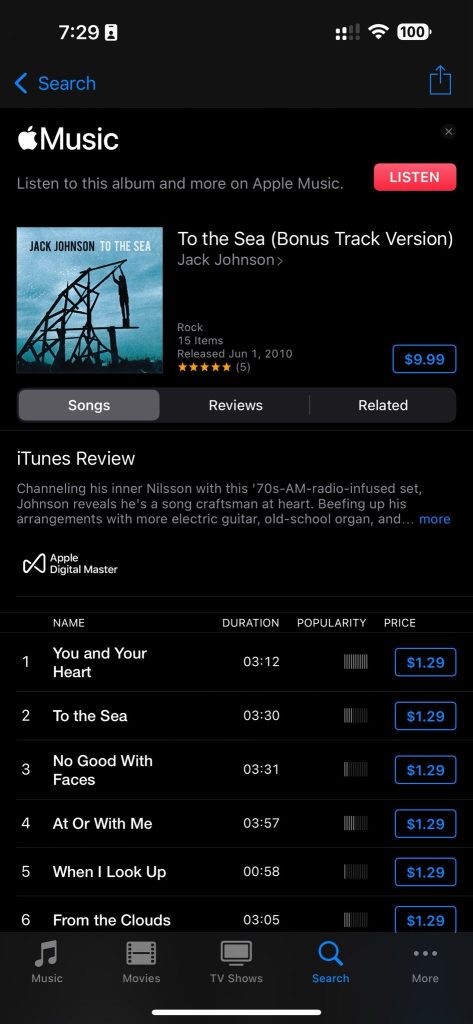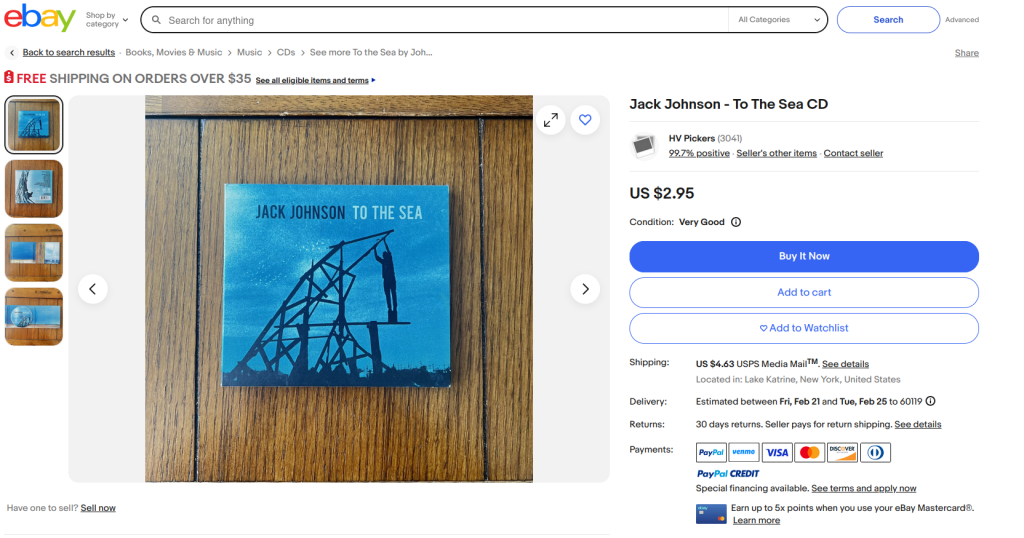Dear Consumer: We Own Your Ass
Judging from the title, you can guess where this is fucking going. No, I’m not going to demand the latest K-Town Girls or whatever the fuck kids are listening to get released on cassette or 8-Track, though that would be pretty sweet. This is an ode to physical media, the problems with digital delivery for both consumers and artists alike, and why it’s time to put a fucking stop to it.
Up until the early 2000s, if you wanted that new jam you heard on the radio, the choice was clear: pop over to your local Sam Goody/FYE/Best Buy/wherever, and plunk down a $20 bill for a shiny piece of plastic. You bought it, you unwrapped it, you popped it out of it’s shitty plastic case… that satisfying “click” as the retainer ring releases… careful not to scratch the bottom as you slide it into your Sony Xplod in-dash CD player… all to have it start displaying TRACK 01 on the liquid crystal display and the music start playing. It was a satisfying aural experience, indulging multiple senses and providing satisfaction. And then…
Look, I don’t wanna blame Napster for liberating media, but it is kinda their fault for popularizing file sharing.
File/Media sharing has gone on since media has existed. So it’s not fair to blame them. They do, however, share a bit of the responsibility here.
Back in the 90s, we didn’t have the pipes we do now. It was PAINFUL downloading a “good” quality rip of a single track over dial-up. Limewire, Napster, Kazaa, SoulSeek, you name it, all suffered as the result of incredibly slow (by today’s standards) bandwidth speeds, even on those new-fangled DSL things. T1 lines were all the rage for big businesses and universities, capped at 1.5Mbps. That’s Mega-BITS per second, not bytes. Dial-up, if you were lucky, got you 56Kbps, again, Kilo-BITS. Point is, your fucking impatience and lack of attention span would have left you blowing your brains out in the early days. In my opinion, however, this was a feature- not a bug. It meant you had to be deliberate about your actions, executing what you set out to achieve- not getting distracted by some listicle about the “top 30 things from the 1970s we don’t do today”. Actually, publishings online like this weren’t prevalent, as every scrap of bandwidth was needed to deliver real and meaningful text- and- in some cases, very low resolution (again, comparing to today) graphics. In short, the internet was a means of communication using INCREDIBLE efficiency due to the lack of resource- bandwidth- we weren’t video calling (and if we were it was only a frame or two per second), voice was still analog. We weren’t streaming the news or binge-watching YouTube-like videos. Between the lack of bandwidth and no online store for digital music, physical media ruled the roost until we hit a tipping point in 2003.
A couple years prior to a reasonable level of saturation of “high speed” cable internet connections (2-3Mbps in most markets), we saw a flurry of devices fondly referred to as PMPs. PMPs are just a generic acronym for Portable Music Players. The most popular and well-known, being the iPod, were clunky to some degree, but filled a certain niche. You could load up a few albums on a device smaller than most smartphones today, and drag them along with you. Before the iPod, the device of choice for SERIOUS folks was the Sony MiniDisc player and platform. MiniDiscs, or MDs, were actually supposed to be the successor those ancient CDs we’d all grown weary of buying and damaging. Besides, CDs were pretty expensive. (In context- a $19.99 CD cost me about two-thirds of a day’s work scrubbing dishes at the little italian restaurant I worked at. Whenever folks talk about how much things cost, it’s an incredibly false sense of worth (and self-worth) when using dollars. The real cost is how many irreplaceable hours of your life it cost you to procure it. Life lesson number 71: start being honest about this real cost and get your fucking priorities straight.) Anywho, the problem with MiniDiscs is that they cost way too much- both the media and the device, plus Sony- a company notoriously bad at software (at the time at least), made some weird choices, from the weird compression algorithms to fit multiple CDs on a single MiniDisc to the design choices of the software. In reality- Sony probably did more damage to the music industry than Napster ever did with some of these choices, like not being able to backup your MiniDiscs like you could CDs. CDs came down in cost by the time MiniDiscs were finally taking hold, but on the flip side of that a very important catalyst in all of this dropped: the iTunes Store.
Steve Jobs knocked it out of the fucking part with the iTunes Store. One app that I can manage my existing music library (again, likely ripped from CD), manage my device (my iPod, which FINALLY supported Windows AND USB instead of requiring a Mac with Firewire), AND I could buy a single track from a CD for 99 cents?! It was a triple threat that shook the entire industry to it’s core.
I’m getting sidetracked with nostalgia though. To the point: go buy some fucking CDs.
Think about your listening habits on these platforms. You’re not listening to new stuff. You’re listening to the stuff you like- the same stuff- over and over. and over. and fucking over. Most of these services have a way to view your highest play counts for songs, albums, artists, etc. So why are you renting it from some tech edgelord? The two largest reasons I hear are “it’s cheaper than buying CDs”, and the second being “it’s better for the environment”. Guess what? BOTH OF THESE ARE FUCKING LIES.
Let’s start with “it’s cheaper”. An individual streaming plan ranges from $9.99 to $14.99. This price point is where many, or even bording into “most” new CDs start. “Why would I buy just one CD for the same price I can listen to an endless amount of shit? How is this cheaper?” Because you don’t listen to an endless amount of shit. You’re falling victim to the Cable TV model here. You’re subsidizing all of the “other” SHIT out there just to listen to the same shit over and over. And the artist? My friend you’re never going to listen to that song enough times to make the same amount of money they’d make from you buying their CD. Even if you wanted just one or two songs from an album, some places do STILL sell single MP3 files. iTunes still does to this day. Don’t want the CD but still want the full album? Buying the entire album is a thing too on iTunes. Here’s a screenshot of one of my favorite albums, clearly $1 cheaper than an individual plan month of streaming of Apple Music:

But ya know what’s even better for your wallet and the environment? Buy a used CD. Remember those round pieces of plastic we were fawning about earlier in this article? Yeah, those fucking things.

$2.95 for a used CD. You not only save something perfectly fine from the landfill, you get the entire album for the cost of two songs on iTunes. Pretty fuckin sweet deal, right? Bonus: YOU OWN IT.
“Why do you keep talking about owning shit?” Well, it’s pretty simple. When you subscribe to a streaming service, they own and control the content. They can pull it down on a whim- whether it’s a licensing or fee dispute, copyright claim, or any other flimsy reason, *they* dictate the terms of your consumption of the product. They’ve commoditized art in the most extreme fashion. We’ve seen this countless times in the past with not only music, but movies and TV shows, and even books. About 10 years ago, Amazon decided to pull every copy of 1984 off of everyone’s Kindle over one of these disputes. If that’s not the most meta thing to ever happen in the existence of streaming platforms I don’t know what is.
Ironically, artists have still made more money with you buying a used CD from eBay than they ever will in a solid month of you streaming their songs.
Still prefer streaming? Or maybe you bought a new car only to realize after the fact that there’s now only a giant fucking black mirror and no CD player? Rip your CDs and copy the files to your phone. Yes- just like we used to do with iPods and other PMPs. Or, if you’re really hellbent on chewing up bandwidth streaming, go down the rabbit hole of setting up your own streaming service using any number of apps like Plex. Either way, stop renting your shit and become the proud owner of your own entertainment. And this isn’t just music- tv shows, movies, books, all subject to this shit. And if you can’t find it legally- i.e., on physical media, just fucking pirate it. The truth is most folks don’t mind paying a fair price for something. They’ve hijacked the entire experience, I’m absolutely fine with telling you to hijack it back and try to make up for it in other ways.